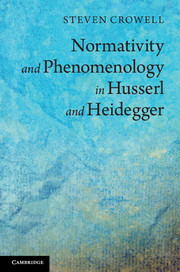Book contents
- Frontmatter
- Contents
- Acknowledgments
- Citation conventions for the works of Husserl and Heidegger
- Introduction
- Part I Transcendental philosophy, phenomenology, and normativity
- Part II Husserl on consciousness and intentionality
- Part III Heidegger, care, and reason
- 8 Subjectivity
- 9 Conscience and reason
- 10 Being answerable
- Part IV Phenomenology and practical philosophy
- References
- Index
10 - Being answerable
Reason-giving and the ontological meaning of discourse
Published online by Cambridge University Press: 05 April 2013
- Frontmatter
- Contents
- Acknowledgments
- Citation conventions for the works of Husserl and Heidegger
- Introduction
- Part I Transcendental philosophy, phenomenology, and normativity
- Part II Husserl on consciousness and intentionality
- Part III Heidegger, care, and reason
- 8 Subjectivity
- 9 Conscience and reason
- 10 Being answerable
- Part IV Phenomenology and practical philosophy
- References
- Index
Summary
In a recent paper entitled “Being With,” Stephen Darwall nods toward Heidegger’s use of the term but follows this immediately with a standard criticism – here attributed to Buber – that Heidegger’s conception of Mitsein “leaves out an essential element, namely, any ‘relation with others … which could breach the barriers of the self’.” Darwall proposes to remedy this defect by appeal to the “second-person standpoint,” which involves affectively acknowledging the authority of the Other in a way that has moral implications. Darwall’s term for the affective aspect is “empathy,” and the moral implication is called “mutual accountability” or “answerability.” What both Darwall and Buber – and, it must be said, a great many interpreters of Heidegger, sympathetic or hostile – overlook, is that the latter are Heidegger’s terms too. In this chapter I shall identify the role that being answerable or accountable plays in Heidegger’s analytic of Dasein. I argue that Heidegger’s phenomenology of the call of conscience entails that giving reasons (logon didonai) belongs to authentic discourse and provides the key to what discourse (Rede) means ontologically. Since this flies in the face of received wisdom – what, after all, is more anathema to Heidegger than reason-giving? – I begin by laying my methodological cards on the table. If I am wrong about these matters, then my argument about how to read Heidegger fails; but if I am right, many conventional approaches to Being and Time must be reconsidered.
- Type
- Chapter
- Information
- Normativity and Phenomenology in Husserl and Heidegger , pp. 214 - 236Publisher: Cambridge University PressPrint publication year: 2013



